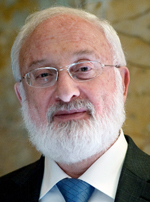The Rise and Fall of the First Temple
By Michael Laitman, PhD

PETACH TIKVAH, Israel — In the previous article, we described Israel’s formation into a nation and how they were given the task to be “a light unto nations” by becoming a model of unity above differences. This article is the first to explore Israel’s attempts to maintain their unity after establishing nationhood, their failure to do so, and the consequences of that failure.
Once they became a nation by vowing to unite “as one man with one heart,” the people of Israel set out to Canaan. Along the way, they had many internal struggles, as well as struggles with external foes. Their growing egos kept challenging them in new ways and they had to find new tactics to overcome them. However, as it is written in The Book of Zohar (BeShalach, item 252), “Anyone who wages a war in the Torah is rewarded with increased peace in the end.” In other words, the wars that the people of Israel fought were over keeping the vow of complete unity.
Still, soon after Israel conquered Canaan and made it the Land of Israel, the disputes grew so fierce that the nation divided into two kingdoms: the Northern Kingdom (Israel) and the Southern Kingdom (Judea). The Northern Kingdom was weaker spiritually and its people quickly abandoned their commitment to unity. The Talmud (Yoma 9b) describes the leaders of the Kingdom of Israel’s malevolence toward each other very poignantly: “Rabbi Elazar said, ‘Those people, who eat and drink with one another, stab each other with the swords in their tongues.’ Thus, even though they were close to one another, they were filled with hatred for each other.” With such relationships, it did not take long for the Kingdom of Israel to dissolve into obscurity to this day.
Meanwhile, in Judea, our forefathers did not behave much better than their now vanished relatives. The 1st century Jewish-turned-Roman historian Titus Flavius Josephus details the misconduct of our forefathers. While the list of misdeeds is far too long for the scope of this article-series, it is important to realize how brutal was the hatred of the Judeans for their brethren. In The Antiquities of the Jews (Book IX, Chap. 5), Josephus offers some gruesome details on the foul manner with which the kings of Israel treated one another. When writing about the anointing of King Jehoram, who ruled merely seventy years after King Solomon, who taught that “Hate stirs strife, and love will cover all crimes” (Prov. 10:12), Josephus says that “As soon as [Jehoram] had taken the government upon him, he betook himself to the slaughter of his brethren and his father’s friends.”
King after king, the rulers of Judea murdered one another in an astonishing display of depravity. Josephus writes that King Manasseh “barbarously slew all the righteous men that were among the Hebrews. Nor would he spare the prophets, for he every day slew some of them, till Jerusalem was overflown with blood” (Book X, Chap. 3).
Clearly, this demeanor was not sustainable, and when the Babylonian king Nebuchadnezzar II invaded the land of Israel, Judea was far too weak to defend against him. Although we are taught that Nebuchadnezzar conquered Judea and destroyed the First Temple, it is important to note that our sages and all the ancient texts do not attribute the fall of the Temple to Nebuchadnezzar, but to our own vices against each other.
Incidentally, this pattern of pointing the finger to our own sins as the cause of our misfortunes, rather than to external foes, was the predominant mindset in antiquity. This changed only in recent centuries, when our arrogance and self-righteousness grew to such levels that we could not see any fault in ourselves and blamed all our troubles on others, despite millennia of our own sages telling and writing otherwise.
The exile in the Babylonian captivity was short but eventful. We will cover the events that led to the threat of destruction and eventual liberation through the Cyrus Declaration in the next article, where once again, we will see that unity brings freedom and happiness, and separation brings misery to our people.
For much more on this topic, please see my latest publication, The Jewish Choice: Unity or Anti-Semitism: Historical facts on anti-Semitism as a reflection of Jewish social discord.
*
Michael Laitman, Ph.D., studied philosophy and Kabbalah at the Russian Academy of Sciences in Moscow, and now resides in Petach Tikvah, Israel. He has published more than 40 books on a variety of topics.